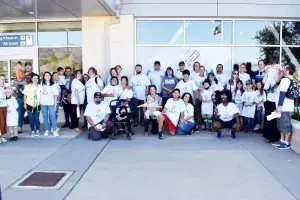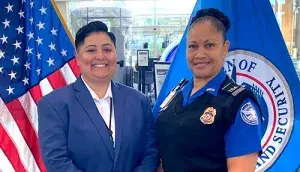
The job of TSA officers is not only to keep travelers safe by providing world-class security, but also to ensure the best passenger experience possible. That goes for passengers from all walks of life, including those who may need extra help, such as people with autism and other visible or hidden disabilities.
Diversity, equity and inclusion are more than just buzzwords at TSA. The agency works hard to make sure travelers with special needs are as comfortable as possible.
A great example of TSA’s attention to being inclusive happened at California’s San Luis Obispo County Regional Airport (SBP), where TSA teamed up with airport staff and stakeholders to help 15 people with autism, who had never flown, do a practice run. The frontline officers, supervisors and management team from TSA assisted a group of children, young adults and their families from the Central Coast Autism Spectrum Center (CCASC) in a security screening walkthrough.
The event, “Able to Soar,” focused on how to ensure an inclusive and equitable environment for all passengers. The experience introduced people with autism to what they would go through to get on a plane at the airport, so they would know what to expect when they fly for the first time.
Children and adults on the autism spectrum often feel extreme anxiety around noise, crowds or unpredictable situations. Doing a dry run takes some of the fear and stress out of a trip to the airport, which can be overwhelming for the senses of those with developmental disabilities.
“I am very proud of our team for assisting the Central Coast Autism Spectrum Center with this amazing event,” said TSA Federal Security Director Anita Minaei. “It highlights one of the many ways TSA employees are truly a part of an inclusive community.”
TSA Manager Lisa Dwyer-Grijalva and Supervisory Officer Heidi Lebreton met with the group at the side of the checkpoint queue to briefly talk about what they should expect while going through screening.
Dwyer-Grijalva spoke about TSA Cares and the benefits it provides to travelers who need help going through security. She provided TSA Cares cards to all participants, which are available for passengers with a disability or medical condition who need extra support at the checkpoint.
“We wanted to contribute to the real-life experience of traveling through the screening process. We were able to accomplish this goal and still keep our mission as the priority not causing any delays,” Dwyer-Grijalva said. “It was a great way for TSA to work with the community and gain understanding of the level of stress families with autism deal with. This is an experience I personally will grow from and walk away with a vast understanding of autism.”
Lebreton said the tour gave the passengers with autism a good look at what it’s like to go through a TSA checkpoint.
“This allows children and adults to become familiar with the process and know what to expect,” she said. “The practice run also helps future passengers become comfortable with TSA's screening process to help reduce the anxiety often caused by unfamiliar events.”
The children and adults with autism returned home with their families less worried and more confident about the possibility of actually taking a trip on a plane. They may still be nervous before a real flight, but some of the pieces of the puzzle of the airport experience were already put together. The experience can help them turn what would probably otherwise be a tough day into one in which they at least have a good chance of managing getting on a plane.
"The Central Coast Autism Spectrum Center is grateful to have been part of an event that truly made a difference in people's lives. Our families are willing to take the step and travel because of ‘Able to Soar,’” said CCASC Executive Director Carly Spears.
April Lewallen, CCASC board president, added, "We appreciate San Luis Obispo County Regional Airport, the local TSA and Alaska Airlines to create an inclusive space and accessible travel for all."
After completing the TSA part of the tour, Dwyer-Grijalva told participants she and her team were thankful for the agency’s role in the practice run. The team also shared information with the CCASC about the various TSA resources available to the traveling public, including TSA Cares.
“The event was amazing and educational to have that experience and really get to know the families. It was not just a special event for the participants but an honor for TSA too,” Dwyer-Grijalva said. “It broadened our sight on what it looks like for families traveling with children and adults with autism, while providing educational and hands-on experiences for all involved.”
By Mike Frandsen, TSA Strategic Communications and Public Affairs


